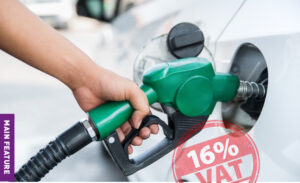Unveiling the Economic Ramifications: The Impact of 16% VAT on Fuel and Fuel Products


The recent proposal to increase the Value Added Tax (VAT) imposed on petroleum from a rate of 8% to 16%, is bound to impact fuel prices and is poised to reverberate across various sectors of the economy. The VAT rate of 8% on petroleum products was first introduced in 2018 after a transition clause which provided for an exemption of the VAT on such products for a period of two years expired. The adjustment in VAT will not only affect the cost of fuel but also carries implications for businesses, consumers, and government revenues.
Inflationary Pressure: Higher VAT on fuel can contribute to inflationary pressure in the economy. Increased fuel prices can lead to higher transportation costs, affecting the prices of goods and services across various sectors. This can result in an overall increase in the cost of living for individuals and households.
Cost of Production: Industries heavily reliant on fuel, such as transportation, manufacturing, and agriculture will experience increased production costs. Higher fuel prices due to VAT can impact the profitability and competitiveness of businesses. This in turn will lead to reduced investments, slower economic growth, and potential job losses.
Consumer Spending: Higher fuel prices resulting from increased VAT will directly affect consumers’ purchasing power. With more money allocated to fuel expenses, consumers will have reduced disposable income for discretionary spending on non-essential goods and services. This in turn will impact sectors like retail, hospitality, and entertainment.
Impact on Businesses: Small and medium-sized enterprises (SMEs) will be particularly affected by higher fuel costs. SMEs may have limited capacity to absorb the additional costs, leading to reduced profitability and competitiveness. This will potentially result in business closures or reduced expansion plans, impacting employment opportunities.
Government Revenue: The increase in VAT on fuel will potentially lead to higher tax revenues for the government. These additional revenues can be utilised for public expenditure in areas such as infrastructure development, social services, or other government programs. However, it is essential to consider the balance between increased revenue and its potential impact on economic activities.
Distributional Impact: VAT on fuel will have a disproportionate effect on low-income households. Since fuel is a significant component of household budgets, an increase in fuel prices can have a greater impact on individuals with lower income levels, potentially exacerbating income inequality.
During the last Monetary Policy Committee meeting of the central bank, the Central bank rate was increased to 9.5% while inflation still hovered above the upper limit band of 7.5% at 9.5% while Consumer prices rose by 0.81%. It is therefore already a very difficult time for Kenyans who are already facing an increase in inflation and interest rates. The increase in VAT for fuel is bound to further drive up these inflationary changes and make life more difficult, especially for the poor.

